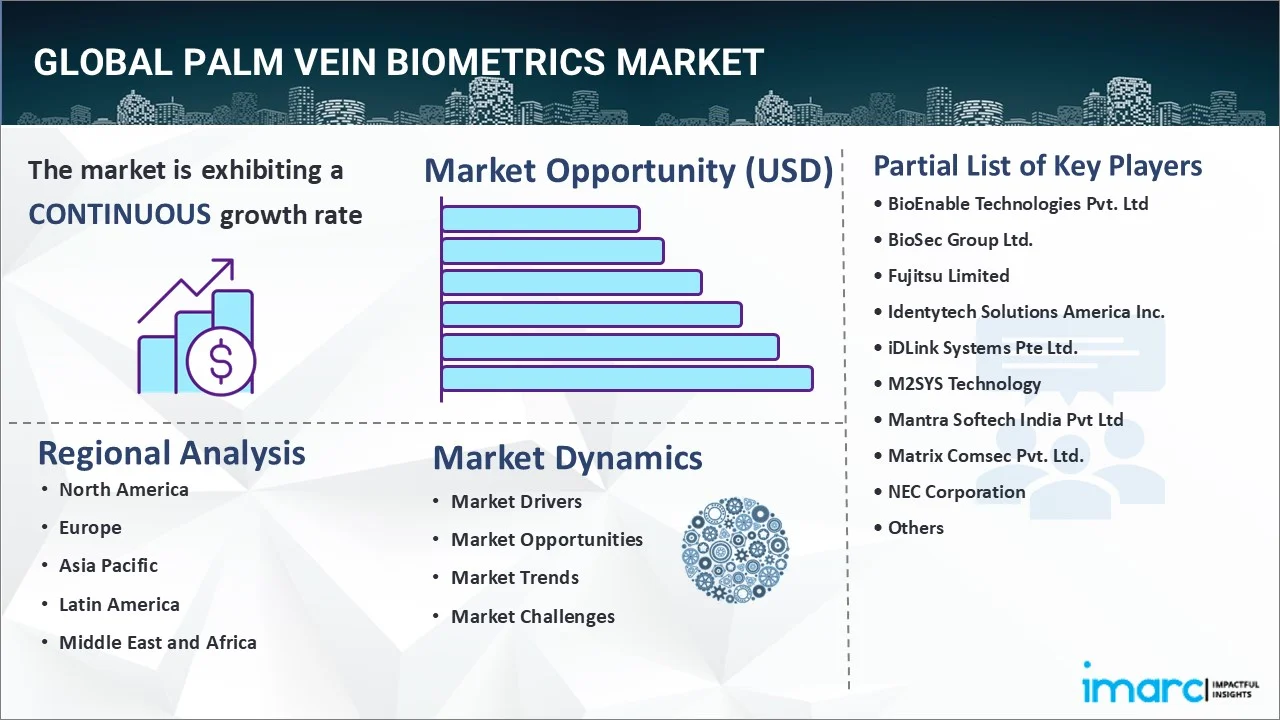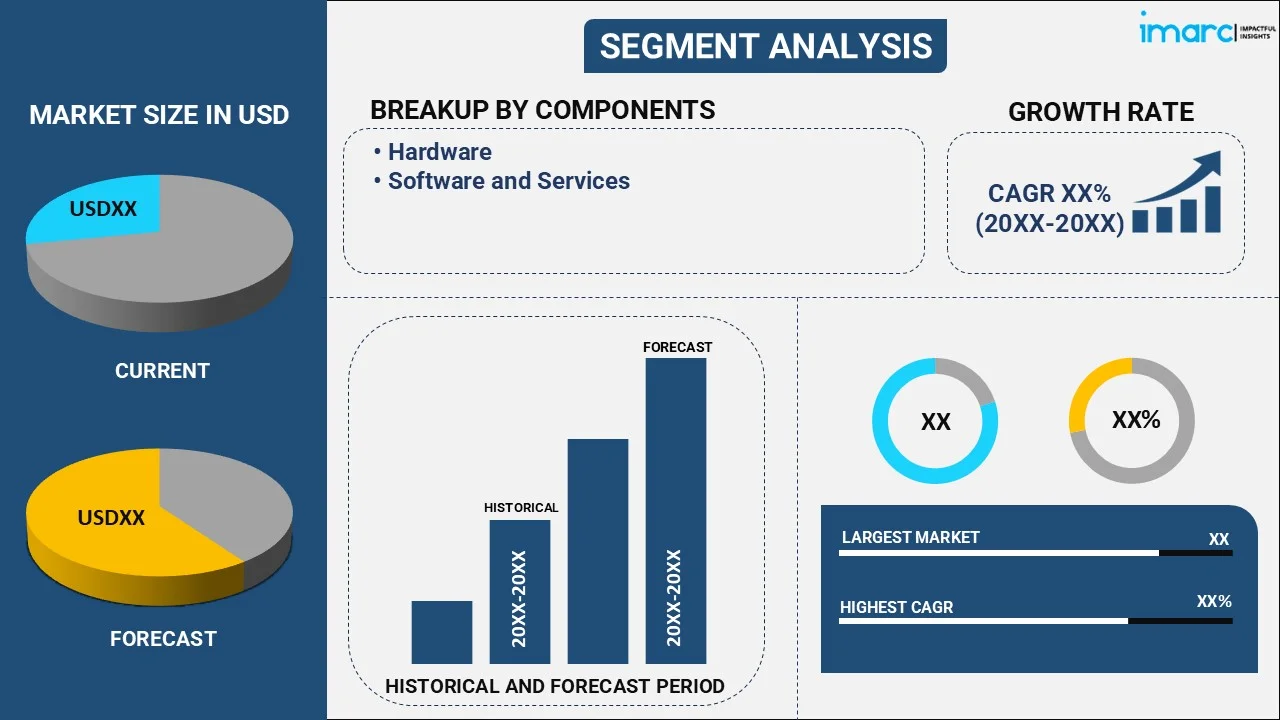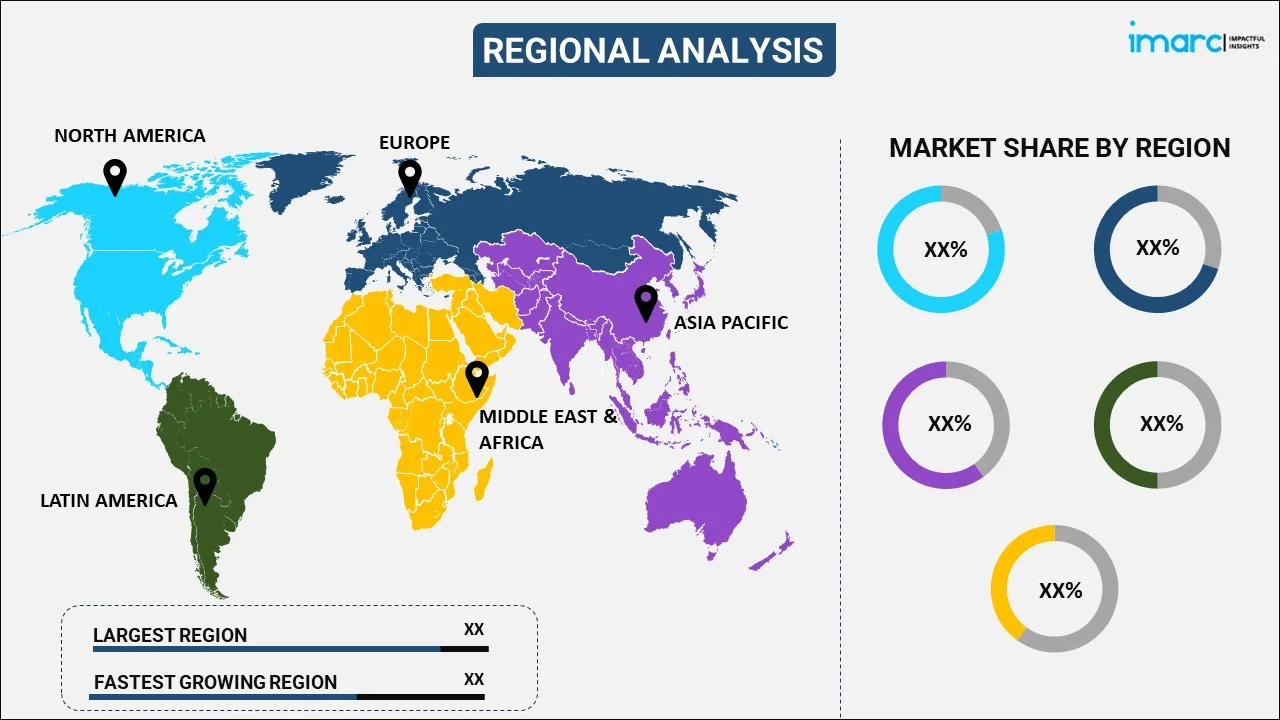
Palm Vein Biometrics Market by Component (Hardware, Software and Services), Application (Banking and Financial Sector, Healthcare, Home Security, Commercial Security, Consumer Electronics, Education, Gaming, Transportation, Government), and Region 2025-2033
Market Overview:
The global palm vein biometrics market size reached USD 1.5 Billion in 2024. Looking forward, IMARC Group expects the market to reach USD 6.8 Billion by 2033, exhibiting a growth rate (CAGR) of 17.83% during 2025-2033. The rising instances of security breaches in the BFSI sector, the growing need for advanced authentication services, and increasing concerns regarding data privacy protection represent some of the key factors driving the market.
|
Report Attribute
|
Key Statistics
|
|---|---|
|
Base Year
|
2024
|
|
Forecast Years
|
2025-2033
|
|
Historical Years
|
2019-2024
|
|
Market Size in 2024
|
USD 1.5 Billion |
|
Market Forecast in 2033
|
USD 6.8 Billion |
| Market Growth Rate 2025-2033 | 17.83% |
Palm vein biometrics refers to an advanced, contactless authentication technology that relies on the vascular patterns of the palm as personal identification data. It works by capturing an image of the vein pattern beneath the skin of an individual using near-infrared light and then comparing and verifying it with the patterns stored in the database for authentication purposes. It involves pairing a biometric scanner with a database server or smart card that contains user information and matches it with the scanned data to provide access. It offers several advantages, such as optimum security, higher accuracy, ease of use, and enhanced reliability. In recent years, palm vein biometrics has gained immense popularity across the globe as a highly secure biometric modality since the data is retrieved from the body, making it difficult to forge.

Palm Vein Biometrics Market Trends:
Due to the rising instances of security breaches, there is a surge in need for advanced security systems across numerous industry verticals, including banking, financial services and insurance (BFSI), government, healthcare, defense, and manufacturing. This, along with the increasing adoption of biometrics for high-security applications, represents the primary factor driving the market growth. Besides this, several favorable initiatives undertaken by governments of various countries to provide unique identity cards to every citizen have augmented the demand for palm vein biometrics. Additionally, the growing business competition across the globe has strengthened the need for securing confidential data among organizations to retain their position in the market. In line with this, the surging utilization of palm vein biometrics in the BFSI sector for secure access control, mobile banking, kiosks, and safe deposit lockers to protect customers against data breaches and identity thefts has catalyzed market growth. Furthermore, there has been widespread product adoption in the healthcare industry for automatic and accurate patient identification, fast retrieval of individual records, and easy patient enrollment. Along with this, the increasing deployment of palm vein biometrics across various government organizations and departments to improve their security, prevent unauthorized access, and combat security issues has propelled market growth. Other factors, including the escalating demand for all-in-one biometric solutions, rising national security concerns, stringent data protection regulations, ongoing product innovations, and continual technological advancements, are also anticipated to provide a positive thrust to the market growth.
Key Market Segmentation:
IMARC Group provides an analysis of the key trends in each segment of the global palm vein biometrics market, along with forecasts at the global, regional, and country levels from 2025-2033. Our report has categorized the market based on component and application.
Component Insights:

- Hardware
- Software and Services
The report has provided a detailed breakup and analysis of the palm vein biometrics market based on the component. This includes hardware and software and services. According to the report, hardware represented the largest segment.
Application Insights:
- Banking and Financial Sector
- Healthcare
- Home Security
- Commercial Security
- Consumer Electronics
- Education
- Gaming
- Transportation
- Government
A detailed breakup and analysis of the palm vein biometrics market based on the application has also been provided in the report. This includes banking and financial sector, healthcare, home security, commercial security, consumer electronics, education, gaming, transportation, and government. According to the report, the banking and financial sector accounted for the largest market share.
Regional Insights:

- North America
- United States
- Canada
- Asia-Pacific
- China
- Japan
- India
- South Korea
- Australia
- Indonesia
- Others
- Europe
- Germany
- France
- United Kingdom
- Italy
- Spain
- Russia
- Others
- Latin America
- Brazil
- Mexico
- Others
- Middle East and Africa
The report has also provided a comprehensive analysis of all the major regional markets, which include North America (the United States and Canada); Asia-Pacific (China, Japan, India, South Korea, Australia, Indonesia, and others); Europe (Germany, France, the United Kingdom, Italy, Spain, Russia, and others); Latin America (Brazil, Mexico, and others); and the Middle East and Africa. According to the report, North America was the largest market for palm vein biometrics. Some of the factors driving the North America palm vein biometrics market included its high number of established manufacturing companies, extensive investments in software technologies, rising adoption of biometrics in the homeland and commercial security, etc.
Competitive Landscape:
The report has also provided a comprehensive analysis of the competitive landscape in the global palm vein biometrics market. Detailed profiles of all major companies have also been provided. Some of the companies covered include BioEnable Technologies Pvt. Ltd, BioSec Group Ltd., Fujitsu Limited, Identytech Solutions America Inc., iDLink Systems Pte Ltd., M2SYS Technology, Mantra Softech India Pvt Ltd, Matrix Comsec Pvt. Ltd., NEC Corporation, Tyco Security Products (Johnson Controls International plc), etc. Kindly note that this only represents a partial list of companies, and the complete list has been provided in the report.
Report Coverage:
| Report Features | Details |
|---|---|
| Base Year of the Analysis | 2024 |
| Historical Period | 2019-2024 |
| Forecast Period | 2025-2033 |
| Units | Billion USD |
| Components Covered | Hardware, Software and Services |
| Applications Covered | Banking and Financial Sector, Healthcare, Home Security, Commercial Security, Consumer Electronics, Education, Gaming, Transportation, Government |
| Regions Covered | Asia Pacific, Europe, North America, Latin America, Middle East and Africa |
| Countries Covered | United States, Canada, Germany, France, United Kingdom, Italy, Spain, Russia, China, Japan, India, South Korea, Australia, Indonesia, Brazil, Mexico |
| Companies Covered | BioEnable Technologies Pvt. Ltd, BioSec Group Ltd., Fujitsu Limited, Identytech Solutions America Inc., iDLink Systems Pte Ltd., M2SYS Technology, Mantra Softech India Pvt Ltd, Matrix Comsec Pvt. Ltd., NEC Corporation, Tyco Security Products (Johnson Controls International plc), etc. |
| Customization Scope | 10% Free Customization |
| Post-Sale Analyst Support | 10-12 Weeks |
| Delivery Format | PDF and Excel through Email (We can also provide the editable version of the report in PPT/Word format on special request) |
Key Benefits for Stakeholders:
- IMARC’s report offers a comprehensive quantitative analysis of various market segments, historical and current market trends, market forecasts, and dynamics of the palm vein biometrics market from 2019-2033.
- The research study provides the latest information on the market drivers, challenges, and opportunities in the global palm vein biometrics market.
- The study maps the leading, as well as the fastest-growing, regional markets. It further enables stakeholders to identify the key country-level markets within each region.
- Porter's five forces analysis assist stakeholders in assessing the impact of new entrants, competitive rivalry, supplier power, buyer power, and the threat of substitution. It helps stakeholders to analyze the level of competition within the palm vein biometrics industry and its attractiveness.
- Competitive landscape allows stakeholders to understand their competitive environment and provides an insight into the current positions of key players in the market.
Key Questions Answered in This Report
The global palm vein biometrics market was valued at USD 1.5 Billion in 2024.
We expect the global palm vein biometrics market to exhibit a CAGR of 17.83% during 2025-2033.
The rising instances of security breaches, along with the increasing utilization of palm vein biometrics, as they offer optimum security, higher accuracy, ease of use, and enhanced reliability, are primarily driving the global palm vein biometrics market.
The sudden outbreak of the COVID-19 pandemic has led to the growing adoption of palm vein biometrics solution as a contactless authentication technology that relies on the vascular patterns of the palm as personal identification data.
Based on the component, the global palm vein biometrics market has been segregated into hardware and software and services. Currently, hardware holds the largest market share.
Based on the application, the global palm vein biometrics market can be bifurcated into banking and financial sector, healthcare, home security, commercial security, consumer electronics, education, gaming, transportation, and government. Among these, the banking and financial sector exhibits a clear dominance in the market.
On a regional level, the market has been classified into North America, Asia-Pacific, Europe, Latin America, and Middle East and Africa, where North America currently dominates the global market.
Some of the major players in the global palm vein biometrics market include BioEnable Technologies Pvt. Ltd, BioSec Group Ltd., Fujitsu Limited, Identytech Solutions America Inc., iDLink Systems Pte Ltd., M2SYS Technology, Mantra Softech India Pvt Ltd, Matrix Comsec Pvt. Ltd., NEC Corporation, Tyco Security Products (Johnson Controls International plc), etc.
Need more help?
- Speak to our experienced analysts for insights on the current market scenarios.
- Include additional segments and countries to customize the report as per your requirement.
- Gain an unparalleled competitive advantage in your domain by understanding how to utilize the report and positively impacting your operations and revenue.
- For further assistance, please connect with our analysts.
 Request Customization
Request Customization
 Speak to an Analyst
Speak to an Analyst
 Request Brochure
Request Brochure
 Inquire Before Buying
Inquire Before Buying




.webp)




.webp)












